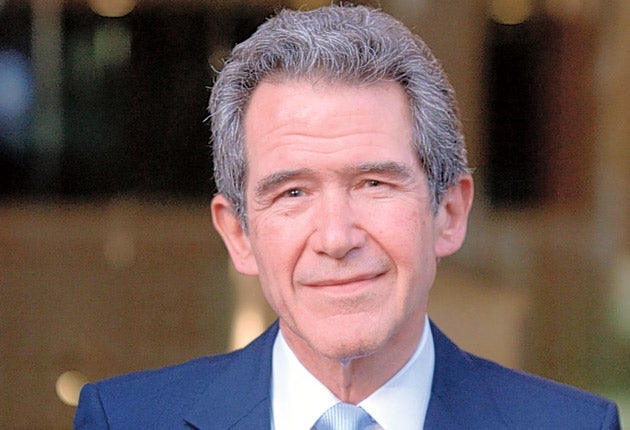Why the former BP boss's new government job is beyond parody
Lord Browne's role has caused a furore, says Andy McSmith

Lord Browne, the former head of BP who was once reputed to be Tony Blair's favourite businessman, has been brought back into the heart of Government to help find the £6.2bn in public spending cuts promised in the Budget.
One of his first tasks will be to help the Cabinet Office minister, Francis Maude, recruit a team of business leaders in the hope of placing one in every government department, to bring a business culture to Whitehall.
Lord Browne was one of Britain's most-admired business leaders in his heyday, with a gift for getting on well with politicians. He was nicknamed the "Sun King", and was so close to the former prime minister, Tony Blair, that it was suggested that an appropriate name for the company he headed would be "Blair's Petroleum".
But critics have suggested that his determination to bear down on costs at BP, where he was chief executive in 1995-2007, contributed to the company's patchy safety record. In 2005, while he was in charge, there was an explosion at the Texas Oil Refinery, in which 15 people died and 170 were injured, for which the company was fined $87m (£58m). An internal report found that BP employees had made "surprising" and "deeply disturbing" mistakes that caused the fire, though the company was praised for the speed with which it accepted responsibility for the disaster.
One of the worst oil spills in Alaska's history in March 2006 was discovered after a workman thought he smelt oil out in the tundra. It turned out that oil had been leaking for at least five days from a hole caused by corrosion in a pipeline operated by BP. An estimated 6,400 barrels of oil had spread in a thick film of oil over two acres of tundra.
BP is now grappling with the worst environmental disaster of its kind in US history, after one of its wells exploded a mile below sea level in the Gulf of Mexico, killing 11 people. It was reported yesterday that the leak is the biggest ever in peacetime.
Some critics attribute these disasters to Lord Browne's drive to cut costs and expand BP. Lord Browne's successor, Tony Hayward, described it as "a management style that has made a virtue out of doing more for less".
Lord Browne, who was ennobled by Tony Blair in 2001, resigned in January 2007 after it was established that he had lied in court about his relationship with a 27-year-old Canadian, Jeff Chevalier. He later became managing director of Riverstone Holdings, a private equity firm.
Michael Meacher, the former Environment Minister, attacked the appointment, saying it was evidence of an "outdated" prejudice that the private sector is always better run than public services. "Lord Browne bears ultimate responsibility for the Texas oil refinery fire and you could argue that the culture of cost cutting that he introduced in BP is responsible for the disaster in the Gulf of Mexico," he said.
"This is a man who goes for the maximum profitability. On the other hand, he is an insider. He was Tony Blair's favourite businessman and is now, it appears, Cameron's, and you can see why they think he's a suitable choice to cut costs in the public sector. His record on cost cutting is a terrible warning to the rest of us."
Caroline Lucas, the Green MP, said: "We should be very concerned. The last thing the Government needs is advice on how to cut corners at all costs. What Britain most needs isn't someone good at axing jobs but someone good at saving them. I can't help thinking that if we bring in a BP-type perspective to running government departments, we can expect a few spills, and quite possibly an occasional disaster."
Lord Browne, who is already running a Government task force looking at university funding, will carry out his latest role part-time and unpaid – unlike Ian Watmore, former chief executive of the Football Association, who is employed full-time running the government's Efficiency and Reform unit.
The Government is committed to cutting £6.2bn-worth of public spending in the financial year, and is hoping a substantial proportion can be achieved by streamlining the civil service.
Mr Maude said: "The appointment of Non-Executive Directors will galvanise departmental boards as forums where political and official leadership is brought together to drive up performance. It's great news for the Government and taxpayer that Lord Browne has accepted this powerful role. His experience will be a real benefit in our drive to make Whitehall work in a more businesslike manner."
Lord Browne said: "This is a role within Government but also independent of it. Its purpose is to assist in the delivery of policy using relevant experience from business. There is a great need for the best of the business community to be involved during these challenging times for the UK."
Subscribe to Independent Premium to bookmark this article
Want to bookmark your favourite articles and stories to read or reference later? Start your Independent Premium subscription today.

Join our commenting forum
Join thought-provoking conversations, follow other Independent readers and see their replies